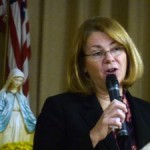Earlier today the Guardian UK asked me if I could rustle up a quick piece on what sort of legacy America could claim from Benedict. I thought about that a bit — the American character, our cultural affinity for work and winning, and this is what I wrote:
. . .not for nothing is the stereotypical American described as “optimistic, work-obsessed and materially prosperous”. We are accustomed to identifying ourselves not by who we are, but by what we do. And we really are, by and large, optimists. A great deal of that optimism hangs on the illusion – and we love this illusion – that in our “classless” society there resides a world full of choices, and on the idea that hard work brings desired results. We believe success builds upon itself in our pursuit of power, position and prosperity – all of which, in return, assist in our philanthropies, because we also believe that we are a generous nation, eager to do good by others.
Today, before our eyes, Pope Benedict’s life and actions addressed all of that. Whatever his departure meant to the rest of the world, it said to Americans and their ideals, “no one is irreplaceable; power isn’t everything; not everything is your choice; sometimes bread cast upon the waters comes back soggy.”
“Well”, some might think, “thanks a lot, Papa, for that encouraging message.”
In fact, Americans should be encouraged by it. There still resides within us the Calvinistic work ethic, the notion that one deserves because one has earned, and that one’s worth is all tied up in those earnings. We feel driven to “push it” (whether it be a job, a relationship, a policy, a bottom line) from one goal to the next. There is a constant sense of striving to earn more, do more, own more, than the next guy. It is a mindset that has parents of not-yet-newborns fighting for a spot at the “best” pre-schools; parents of 13-year-olds pestering them about their eventual college essays. It is a culture that celebrates the “winner”, ignores the “loser” and encourages the weird Kardashian life goal of pursuing fame for its own sake.
Still, we continue to push the limits: our powerful until they are only corrupt, our daring athletes until they are only doping apes, our rich until they are ridiculous.
All of this continual advancing doesn’t leave us happy and fulfilled. This is what Jesus meant when he said “where your treasure is, there your heart will be also” (Luke 12:34), the life of endless pursuit, ungrounded by something larger than the self, brings us only to the sort of futile emptiness that wreaks havoc on our souls and provides so much fodder for so many gossipy headlines.
And this is where Benedict’s lesson comes in, because today, as he entered Castel Gandolfo, and called himself “no longer the pope … just a pilgrim”, he put the lie to many American ideas and illusions and instead offered encouragement we should take to heart – particularly as our economy shudders and our leadership continues to spar rather than lead.
To those who are out of work or worried about their jobs, Benedict’s move says, “what you do does not define who you are.” To those experiencing “downward mobility” it says: “your trappings make you less free; do not be afraid to shed them.” To those who feel like choices have disappeared, it says: “when someone else chooses for you, what you make of it is your own.”
You can read the rest here.












